Oscar Pistorius trial: Did Reeva Steenkamp get justice?
- Published

Oscar Pistorius was a picture of composure as the judge announced he was guilty of culpable homicide, or manslaughter, for killing his girlfriend Reeva Steenkamp.
The athlete, who became emotional on Thursday after being described as an "evasive witness", seemed to have been expecting this verdict.
The judge had already spoken of his negligence and use of "excessive force" when he fired through the door.
Although he was acquitted of the most serious charge, culpable homicide still carries a prison term of up to 15 years but, unlike murder, the judge may use her discretion and suspend the sentence or only impose a fine.
Some say this is the best outcome he could have hoped for.
Friends and relatives of Reeva Steenkamp wept, as the poised and soft-spoken Judge Thokozile Masipa handed down her judgement.
Reeva Steenkamp's mother, June, seemed shell-shocked.
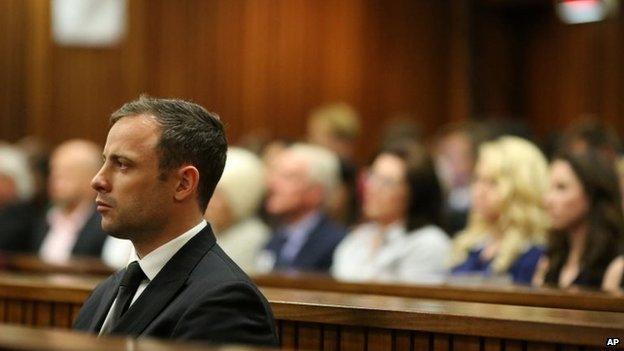
Oscar Pistorius was calmer in court on the second day of the verdict hearing
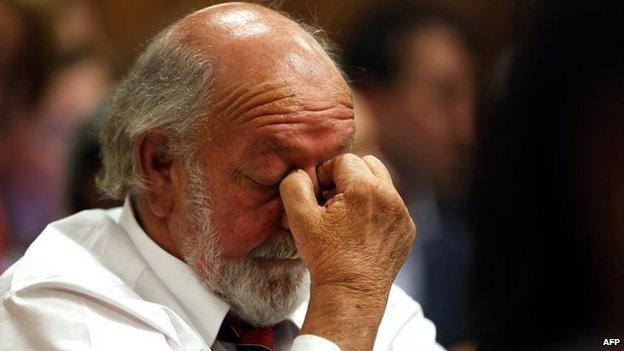
Reeva Steenkamp's father, Barry, reacts as the verdict is given
The Steenkamps left the court soon after the hearing ended, no doubt keen to get away.
'Deeply affected'
The Pistorius family addressed the media in the courtroom where the verdict was delivered.
Arnold Pistorius, the family patriarch, addressed the throng of media crammed on the court benches and thanked Judge Masipa for not convicting his nephew of murder, saying "a huge burden had been lifted".
"We as a family remain deeply affected by this devastating tragedy," he said with his wife, Lois, standing by his side.
"It won't bring Reeva back but our hearts do go out to her friends and family," Mr Pistorius continued.
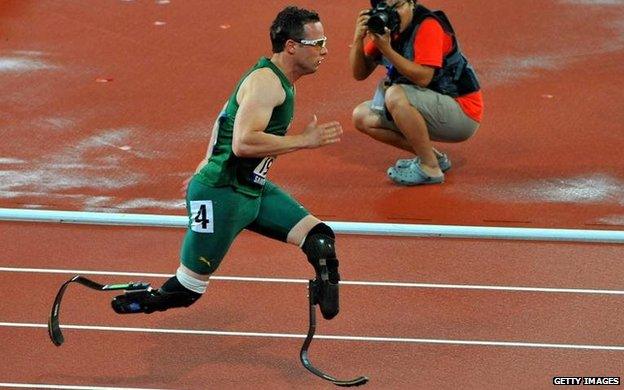
Pistorius was once revered by South Africans for overcoming extreme adversity
Pistorius himself was not there - he had left moments earlier.
As the Paralympic champion was escorted out of the courthouse, scores of young women screamed and cheered, like fans at a rock concert.
But the case is not yet over. It will resume on 13 October, when Judge Masipa will sentence the athlete.
For the past six months, the world has had a front row seat watching the fall from grace of the man referred to as the "blade runner".
As the case enters its final stretch, two courts in South Africa are now debating Judge Masipa's verdict - the courts of public opinion and of the legal system.
Some legal experts say she followed the law impeccably, by looking at the evidence before her and then evaluating whether the state had proven its case.
But others have been unsettled by her ruling that Pistorius was not guilty of murder, saying the prosecution had grounds to appeal.
In South Africa, a perpetrator can be convicted of murder if he or she had foreseen that their actions would lead to someone's death and still proceeded with that course of action.
Ms Masipa said she could find no proof that Pistorius had the requisite intention to "kill the deceased, or anyone else for that matter".
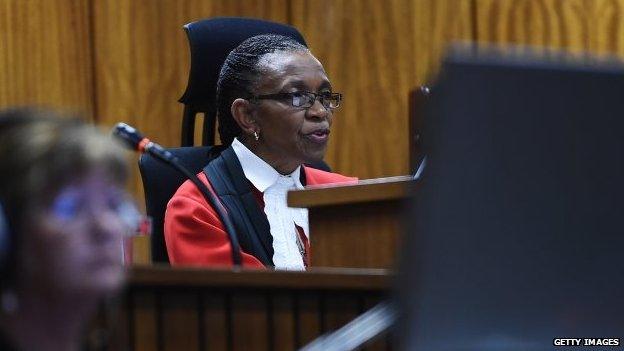
Judge Masipa has a reputation for fairness in court circles
Legal expert Prof Pierre de Vos tweeted : "Not sure rejection of [murder charge] is correct here.
"Surely if you shoot into a door of a small toilet and know somebody behind door you foresee and accept possibility of killing?"
But the judge clearly said on both Thursday and Friday that the prosecution had not proven beyond reasonable doubt that the athlete had foreseen that he would kill someone when he fired four shots through the door of his toilet in the early hours of Valentine's Day 2013.
The judge, perhaps anticipating the backlash, said the verdicts had been reached unanimously. There are no juries in South Africa but she was assisted throughout the trial by two assessors.
Judge Masipa, a figure of quiet authority, has a reputation for fairness in court circles and is well respected - but on the streets this has somewhat changed.
On social networking sites and among the crowds outside court, many say they feel Pistorius got off lightly because of his fame and his ability to employ expensive lawyers.
Thankfully for her, public opinion has no bearing inside court.
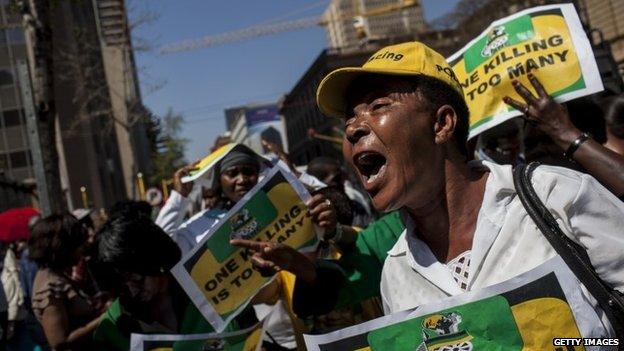
Protesters say that Reeva Steenkamp was failed by the court system
South Africa itself has been on trial over the same period. The world has been told of police bungling and a spotlight has shone on the fear of crime.
There is a perception here in South Africa that most crime is committed by poor black people targeting the white middle classes or the wealthy elite.
Cue "white fear" - a phrase used to refer to the rich white haves in society who live behind high walls, afraid of the intruder who may come in the night. It was the threat of this intruder that apparently gripped Pistorius with fear on that tragic morning.
In a country where domestic violence is a serious problem, it is not surprising that many hoped this case would be an impetus for change in the laws protecting women.
It was never proven that this was a case of domestic abuse but this did not stop political parties and women's organisations from using Ms Steenkamp as the face of the vulnerable woman - failed by her country and the system.
#JusticeForReeva is currently trending among South Africa's Twitter users.
Outside court, one protester told me: "Women always lose".
But whether or not he spends time in prison, the Oscar Pistorius the world celebrated and South Africa collectively worshipped is gone forever.
While the Steenkamps feel they still have not had justice for their daughter.
"This verdict is not justice for Reeva," her mother, June told NBC. "I just want the truth."